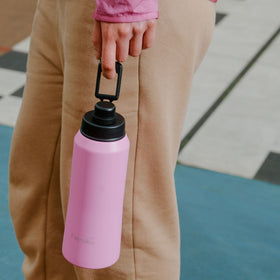
Why Spray Sunscreens Are Bad For You and The Planet
You’ve likely come across spray sunscreens when looking for sun protection. They’re fast and seem easier to apply. Plus, they’re convenient and portable.
But they’re not as good as you might think, and even the Cancer Council warns against them. Reported incidents in Australia talked about serious sunburn incidents after application. It turns out many people have been underapplying with their aerosol sunscreen. Using a spray sunscreen has concerns for you and for the planet, too.
Why spray sunscreens are bad for you
Based on the Australasian Journal of Dermatology, 85% of people don’t put on enough sunscreen, regardless of the product type.
The popularity and use of aerosol sunscreens is on the rise. Like other sunscreens, though, the problem is that people don't apply enough. Even more of an issue is that you need to spray that sunscreen for 29 to 98 seconds to cover your whole body. You could be leaving yourself open to too much sun exposure without even knowing it.
According to a 2020 Arpansa report, some aerosol products contained less than 50% sunscreen ingredients. The rest were propellants (one product even had 83% propellant).
Propellants can decrease a product’s effectiveness or sun protection. What’s more, they may dilute the SPF in a sunscreen mist. So you need to use a lot more if you're using a sunscreen spray rather than a lotion or cream.
There are also dangers with the aerosol, including inhalation risks. SPF sprays have a higher risk of inhalation than regular lotion, as it’s much easier to breathe in. There have also been warnings that inhaling potentially dangerous ingredients can cause lung irritation.

Why spray sunscreens are bad for the planet
The spray on sunscreen that you use on your skin can also cause serious harm to coral reefs and marine life.
Sunscreens use two different methods to protect your skin from the sun’s rays. There are chemical absorbers like oxybenzone and physical blockers like zinc oxide. The absorbers are the main culprits because they could accumulate in reef areas. They only work by absorbing rather than blocking UVA and/or UVB rays.
There's also oxybenzone (benzophenone-3 or BP-3), a chemical sunscreen ingredient. It absorbs ultraviolet light and is toxic to fish and coral reefs. Research studies found that this ingredient leads to significant damage to coral reefs. It also causes coral bleaching by triggering viral infections.
Another harmful sunscreen mist ingredient is octinoxate. It’s an organic compound used as a UV filter in sunscreens and other cosmetics. While it may be good for human use, octinoxate is extremely dangerous to corals. Hawaii banned these two active ingredients due to their damaging effects on coral reefs.

What’s the alternative?
Put on mineral sunscreen instead of using a sun spray. Eco friendly sunscreens have active mineral ingredients like zinc oxide or titanium dioxide. Both can create a physical barrier (which is why they're also known as physical sunscreen). These ingredients sit on top of the skin to deflect or scatter the damaging UV rays away from the skin.
Choose natural sunscreens with a physical blocker like the ones at Hello Charlie. Because zinc and titanium oxides are thick, they come in a lotion.
But there are stick mineral sunscreens available, like the ones from 123 Nourish Me, a favourite brand in our natural sunscreen cheat sheet.
Remember that using a zinc oxide sunscreen or titanium dioxide sunscreen is only one line of defence against sunburn and skin cancer. Don't forget to use everything you can to protect your skin: slip, slop, slap, seek and slide. The Cancer Council SunSmart program reminds you to:
- Slip on a shirt or a rashie.
- Slop on some mineral sunscreen that’s water resistant and SPF 30 or higher.
- Slap on a broad brim hat that shields the head, face, ears, and neck.
- Seek shade.
- Slide on some sunnies.
Choose a good sunscreen and reapply often
Using aerosol sun spray is a problem because of the way it goes on, as well as the ingredients in it. That doesn't mean that you shouldn't use sunscreen.
Instead, choose reef safe sunscreens like the ones at Hello Charlie. And don't forget to use natural sunscreens and reapply often!










